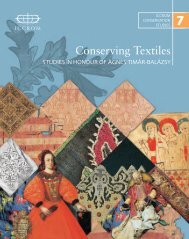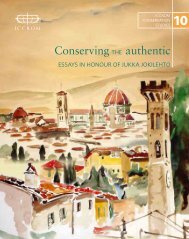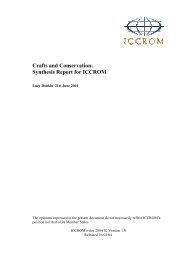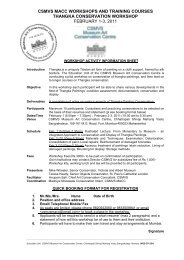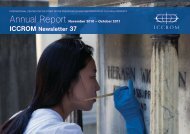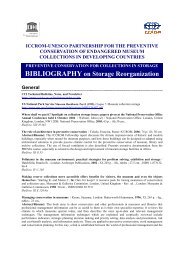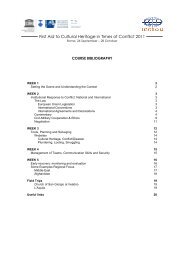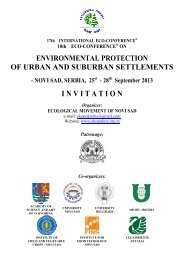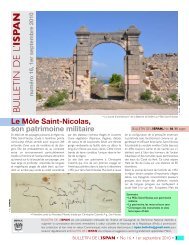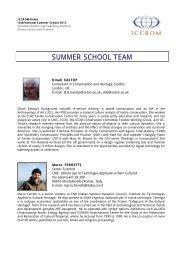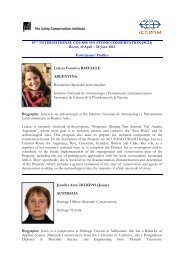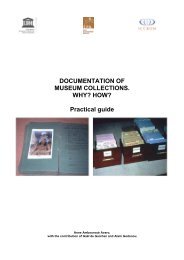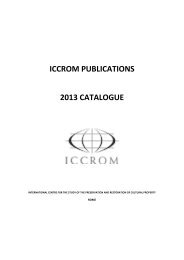Uncomfortable Architectural Heritage of Socialism - Iccrom
Uncomfortable Architectural Heritage of Socialism - Iccrom
Uncomfortable Architectural Heritage of Socialism - Iccrom
You also want an ePaper? Increase the reach of your titles
YUMPU automatically turns print PDFs into web optimized ePapers that Google loves.
CALL FOR PAPERS<br />
In March 2012, the postgraduate course <strong>of</strong> studies European Cultural <strong>Heritage</strong> at the European<br />
University Viadrina will host an international and interdisciplinary conference titled<br />
<strong>Uncomfortable</strong> <strong>Architectural</strong> <strong>Heritage</strong> <strong>of</strong> <strong>Socialism</strong><br />
A comparison <strong>of</strong> social acceptance in Eastern and Central Europe<br />
„Difficult heritage is a past that is recognized as meaningful in the present but that is also contested and<br />
awkward for public reconciliation with a positive self-affirming contemporary identity.“<br />
Sharon Mcdonald<br />
Parts <strong>of</strong> the uncomfortable heritage <strong>of</strong> the socialistic era are many buildings and places that remind us <strong>of</strong><br />
the political ideology <strong>of</strong> socialistic regimes. Examples are the by now dismantled Palace <strong>of</strong> the Republic<br />
in Berlin, the House <strong>of</strong> the Soviets in Kaliningrad and the Palace <strong>of</strong> the Parliament in Bucharest.<br />
As a result <strong>of</strong> the transformational processes in Eastern and Central Europe, uncomfortable architectural<br />
heritage has to face significant changes: many buildings have been altered, converted or dismantled.<br />
Today, some buildings serve as memorial places or museums. Others have fallen into oblivion. How to<br />
deal with the socialistic regimes‘ biased legacies is a question that still remains problematic and up to<br />
date two decades after the political overthrows.<br />
Since the socialistic epoch is subject to the ambivalent evaluations <strong>of</strong> different social groups, critical<br />
debates as well as nostalgic emotions, the conference will focus on the following questions:<br />
For whom is such architectural heritage uncomfortable? How are political decisions concerning<br />
uncomfortable heritage prepared and carried out? What role does public opinion play? How does the<br />
media influence society’s image <strong>of</strong> the building? Does an <strong>of</strong>ficial heritage status or the intervention <strong>of</strong><br />
international organisations contribute to a change in acceptance? How did the situation change during<br />
the past two decades?<br />
For the purpose <strong>of</strong> the conference, the term “uncomfortable architectural heritage” shall be determined<br />
as follows:<br />
<br />
a building that reflects a part <strong>of</strong> the history <strong>of</strong> a country, a certain region, a society or a culture or<br />
respectively is or has been <strong>of</strong> importance for such
Remembering this part <strong>of</strong> history is uncomfortable today. That means thinking about it is<br />
stressful and painful for the society or respectively certain groups <strong>of</strong> society<br />
Preserving the architectural heritage is contested within the society or respectively politics (due<br />
to its uncomfortable connotations)<br />
It was either built during socialism or gained in importance during this era<br />
Furthermore, presentations shall not be centred on cenotaphs<br />
The conference’s object is to align research levels concerning uncomfortable socialistic heritage within<br />
Europe. It does not only address to scientists specialising in monument conservation but also to<br />
interested persons from other areas <strong>of</strong> expertise. You are invited to hand in abstracts <strong>of</strong> approximately<br />
200 words for presentations in German or English. Each presentation is limited to 20 minutes. Deadline<br />
for abstracts is 30 September 2011. Please attach a short CV, stating your occupation and area <strong>of</strong><br />
expertise. We also welcome critical and controversial inputs!<br />
The conference will take place in Berlin in March 2012. A publication is planned subsequent to the<br />
conference.<br />
Organisers <strong>of</strong> the conference are:<br />
Eszter Takacs, Heiko Krueger, Kamila Palubicka, Katrin Westphal and Veronica Kölling<br />
Contact:<br />
Veronica Koelling<br />
Email: heritage-conference@europa-uni.de<br />
In cooperation with:<br />
Landesdenkmalamt Berlin (state <strong>of</strong>fice for protection <strong>of</strong> historical monuments)<br />
European University Viadrina in Frankfurt Oder<br />
Berlin, 02 August 2011



